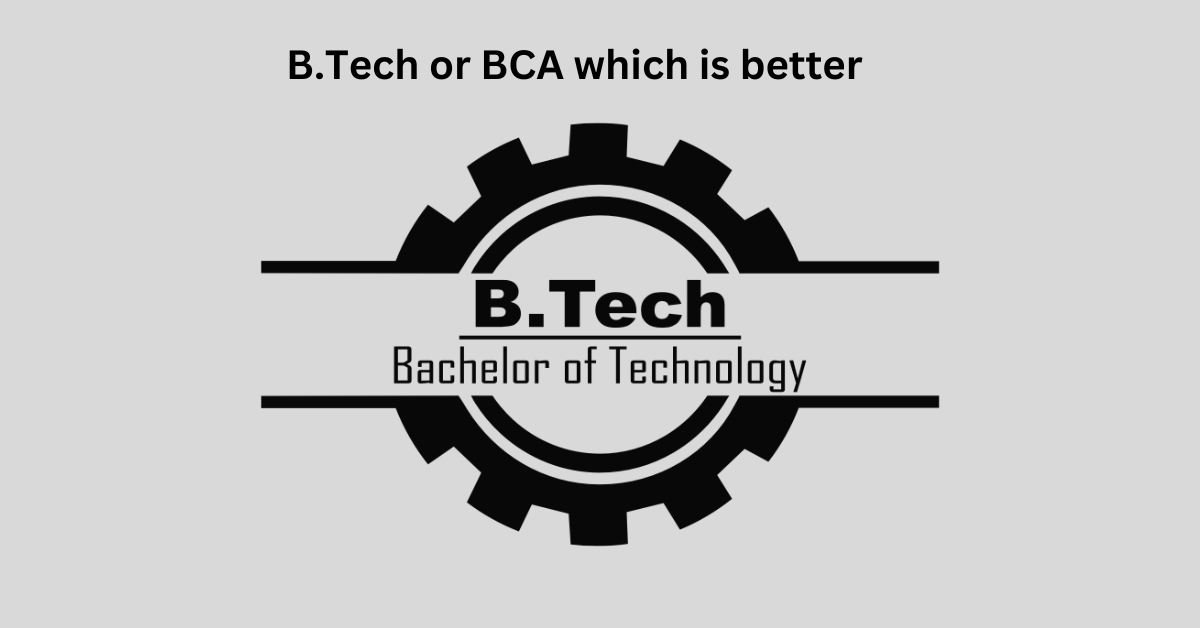
B.Tech vs. BCA : Which is the Better Career Choice?
In the fast-paced world of technology and computer science, choosing the right educational path is crucial for a successful career. Two popular undergraduate courses often at the forefront of this decision-making process are Bachelor of Technology (B.Tech) and Bachelor of Computer Applications (BCA). Both programs offer exciting opportunities, but which one is the better choice? In this comprehensive guide, we will compare B.Tech and BCA based on various factors to help you make an informed decision.
1. Course Overview
B.Tech: Bachelor of Technology, commonly known as B.Tech, is a 4-year undergraduate program that provides a deep understanding of various engineering disciplines. It offers specializations in fields like Computer Science and Engineering, Electronics and Communication Engineering, Mechanical Engineering, Civil Engineering, and many more. B.Tech programs focus on developing strong technical and problem-solving skills, making graduates eligible for a wide range of job opportunities in both the public and private sectors.
BCA: Bachelor of Computer Applications, or BCA, is a 3-year undergraduate program that primarily focuses on computer science and application development. BCA curriculum includes subjects such as programming languages, data structures, database management, and web development. It is designed to prepare students for careers in software development, IT consultancy, and various roles in the software industry.
2. Curriculum
B.Tech: The B.Tech curriculum is extensive and covers a wide range of subjects in engineering and technology. Students have the flexibility to choose a specialization that aligns with their interests and career goals. Core subjects typically include mathematics, physics, and various engineering courses. This program also emphasizes practical skills through laboratory work and project-based learning.
BCA: In contrast, BCA has a more focused curriculum centered on computer science and its applications. Students learn programming languages like C++, Java, and Python, along with database management, web development, and software engineering principles. BCA programs often incorporate internships or projects to provide real-world experience.
3. Duration of the Program
B.Tech: B.Tech is a 4-year program in most cases, although some specialized programs may extend to 5 years. The longer duration allows for a more in-depth exploration of engineering concepts and specializations.
BCA: BCA is a 3-year program, making it a shorter route to enter the workforce. This can be appealing to those who want to start their careers sooner.
4. Eligibility Criteria
B.Tech: To pursue a B.Tech degree, students typically need to have completed their 10+2 education with a strong background in science, particularly in subjects like physics, chemistry, and mathematics. Admission to B.Tech programs is often highly competitive, with entrance exams like JEE (Joint Entrance Examination) being common in many countries.
BCA: BCA programs generally have more relaxed eligibility criteria. Students with a 10+2 qualification in any stream, including arts or commerce, can apply for BCA programs. While mathematics may be a preferred subject, it is not always mandatory.
5. Career Opportunities
B.Tech: A B.Tech degree opens up a wide range of career opportunities in various industries. Graduates can work as software engineers, civil engineers, mechanical engineers, electronics engineers, and more. They are eligible for roles in IT companies, manufacturing firms, government organizations, and research institutions. B.Tech graduates can also pursue higher studies such as M.Tech or MBA for further specialization.
BCA: BCA graduates are primarily focused on careers in the IT sector. They can work as software developers, web developers, system administrators, database administrators, and IT consultants. BCA graduates often find employment in software companies, IT service providers, and e-commerce companies. Some may choose to pursue MCA (Master of Computer Applications) for advanced career opportunities.
6. Salary Potential
B.Tech: The salary potential for B.Tech graduates can vary significantly based on their specialization and the industry they enter. Engineering disciplines like computer science, electrical engineering, and mechanical engineering tend to offer higher starting salaries compared to other fields. On average, B.Tech graduates can expect competitive pay packages.
BCA: While BCA graduates can secure well-paying jobs in the IT industry, their starting salaries may be slightly lower than those of B.Tech graduates. However, with experience and expertise, BCA professionals can achieve salary levels comparable to their B.Tech counterparts.
7. Skillset
B.Tech: B.Tech programs are known for imparting strong technical and problem-solving skills. Graduates are well-versed in engineering principles, mathematics, and scientific concepts. They often possess a broader understanding of various fields of engineering.
BCA: BCA graduates excel in programming and software development skills. They have a deep understanding of computer science concepts and are proficient in languages like Java, C++, and Python. Their expertise lies in software application development and IT management.
8. Industry Demand
B.Tech: Engineering, as a field, always maintains a consistent demand in various sectors such as construction, manufacturing, and technology. B.Tech graduates are sought after by a wide range of industries, making it a versatile degree.
BCA: The demand for BCA graduates is primarily concentrated in the IT and software industry. With the increasing reliance on technology, there is a continuous need for skilled software developers and IT professionals.
9. Job Stability
B.Tech: B.Tech graduates often enjoy strong job stability, especially if they are specialized in high-demand engineering fields. The diversity of industries that hire B.Tech graduates contributes to their job security.
BCA: Job stability for BCA graduates is also quite good, given the persistent demand for IT professionals. However, it can be influenced by factors such as technological advancements and the economic climate.
10. Further Education
B.Tech: B.Tech graduates can pursue various postgraduate options, including M.Tech, MBA, or even research-oriented programs like a Ph.D. This allows for further specialization and career growth.
BCA: BCA graduates can opt for an MCA (Master of Computer Applications) to enhance their qualifications and job prospects. MCA programs offer advanced knowledge in computer science and applications.
11. Entrepreneurship Opportunities
B.Tech: B.Tech graduates can leverage their technical skills to start their own engineering firms or tech startups. The entrepreneurial possibilities are vast, particularly for those with innovative ideas and a passion for technology.
BCA: BCA graduates can also explore entrepreneurship by establishing software development companies, web development agencies, or IT consulting businesses. The IT sector offers numerous opportunities for entrepreneurs.
12. Work-Life Balance
B.Tech: Work-life balance in engineering careers can vary based on the industry and job role. Some engineering jobs may require long working hours, especially in critical project phases, while others offer more predictable schedules.
BCA: BCA professionals in software development and IT often enjoy better work-life balance, with many IT companies promoting flexible work hours and remote work options.
13. Job Diversity
B.Tech: B.Tech graduates can find jobs in a wide array of sectors, including aerospace, automotive, telecommunications, energy, and healthcare. This diversity allows them to explore different industries and job roles.
BCA: BCA graduates primarily work in the IT sector, but within this domain, they can find diverse roles such as software development, cybersecurity, data analysis, and IT management.
14. Industry Trends
B.Tech: The engineering industry is constantly evolving with technological advancements. B.Tech graduates need to stay updated with the latest trends and innovations in their respective fields.
BCA: The IT industry is known for rapid technological changes. BCA professionals must keep up with emerging technologies, programming languages, and software development methodologies.
15. Personal Interests and Goals
Ultimately, the choice between B.Tech and BCA should align with your personal interests and career goals. Consider your passion for technology, your preferred work environment, and your long-term aspirations when making this decision.
Conclusion: B.Tech or BCA – Which is Better?
The choice between B.Tech and BCA depends on various factors, including your educational background, career goals, interests, and the industry’s demand in your region. Both programs offer promising career opportunities and the chance to make a significant impact in their respective fields.
Best B.Tech College in Allahabad
If you are passionate about engineering, have a strong foundation in science and mathematics, and are open to diverse career opportunities, B.Tech may be the better choice for you. On the other hand, if you are enthusiastic about software development, programming, and IT-related roles, BCA could be the ideal path to kickstart your career in the technology sector.
Ultimately, success in either field depends on your dedication, skills, and willingness to adapt to the ever-changing landscape of technology and engineering. So, choose the path that resonates with your interests and aspirations, and you’ll be well on your way to a rewarding and fulfilling career.



